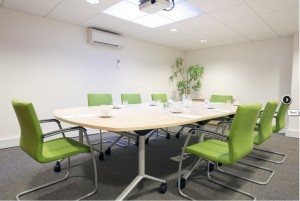February 15th, 2017

Most small business owners spend a lot of time in meetings, whether with colleagues or existing and prospective clients. However, all too often meetings to plan projects or examine progress can be less effective than they should be, with recent research suggesting that too much valuable business time can end up being wasted.
Basepoint works closely with many small companies who rent serviced offices in our business centres, as well as hiring our serviced meeting rooms. We support our licensees in a whole range of business tasks, offering mentorship and networking opportunities. Here are some pointers on how to ensure meetings are both time and cost-effective.
Set Aims in Advance – Knowing beforehand what you want to achieve by the end of the meeting will give it direction and avoid it turning into just a “talking shop”. Setting clear aims can ensure the meeting achieves what is intended. It’s vital to take enough time planning a meeting and thinking it through beforehand. Indeed, some business owners estimate you may need to spend twice as long on planning as on actually attending the meeting.
Draw Up an Agenda – One recent survey suggested that more than 60% of meetings do not have an agenda. However, setting out in advance exactly what the key items are to be discussed is an essential part of making sure a meeting is effective. Without an agenda, a meeting is more likely to become repetitive and jump around. It’s advisable to send out papers at least a day or two before the meeting, and to keep them as short and to-the-point as possible. If people are sent piles of paperwork, they may not have time to go through it all, and this could lead to time being lost when they have to examine at the material in the meeting itself.
Decide Who Needs to Be There – Meetings with fewer people can often be quicker and more effective than those attended by a large number. If too many people are present, it might make discussions take too long and lead to unproductive discussions. It is often best only to have the leaders and decision makers there, and then to let them brief others. This also cuts down on the number of employee hours devoted to one meeting. However, there is a balance to strike here, since it can equally cause a problem if someone directly involved, whose input is needed, is left off the list for the meeting.
Let Everyone Can Have a Say – There can sometimes be problems with one or two individuals dominating a meeting. If you are organising or running the meeting, you will need to make sure that quieter people whose input is needed don’t get drowned out. One way to address this could be by making the agenda include the names of people whose input will be needed on particular topics.
Assign Tasks Clearly – When it is agreed that a certain action should be taken, it is important to decide whose responsibility this is to take it forward and to record it in writing. If a piece of work is not clearly assigned to an individual or department, there is a risk you could end up with everybody waiting for someone else to do it. Alternatively, another danger is that different people could start working on the same task separately and in a disjointed way.
Keep the Meeting Running to Time – Even if a meeting has been well planned in advance, there can often be a risk of it overrunning by a long time. Some overrunning may be unavoidable, but if you are running the meeting you will want to try to keep this to a minimum. For instance, if an issue is raised which had not previously been considered, it could help to suggest that this is left to a later meeting so that full preparation work can be done.
Make Sure the Meeting Room is Comfortable – If a meeting room is too hot, too cold, or has uncomfortable seating, this can make it hard to concentrate and affect the meeting in terms of productivity.Basepoint’s meeting rooms can be booked by people who rent serviced offices from us and also by virtual office licensees and other businesses and individuals. They are comfortable and well-equipped, with AV equipment and flip charts available for hire, while some centres have large LED TVs complete with Apple TV and Chromecast. We also provide many other facilities for meetings, including pads and pencils and water, and you can arrange to use our refreshments and catering services.
As well as hiring meeting rooms at our centres, in areas including Camberley, Crawley, Bromsgrove and Southampton, licensees can also chat to colleagues and clients informally in our friendly and well-equipped break-out areas. Click to see details of the meeting rooms at Basepoint Business Centres.